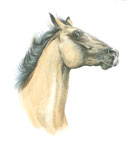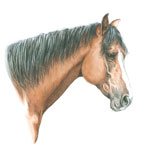Horse Body Language
A horse communicates how it is feeling at any given moment through his body language. A horse’s mood is evident through various signs expressed, so as long as you know what you’re looking for, you can determine how your horse is feeling.
Afraid, Anxious, or Nervous



When a horse is feeling afraid or anxious, the head and neck are typically held high, and the muscles are tensed. The whites of the eyes may be showing, and the horse may be quivering or trembling. The tail may be tucked tightly against the hindquarters. The horse often can’t stand still and may try to bolt. He may also grind his teeth.




An alert or focused horse’s body language is reflected in ears pointed in the direction of where the horse is looking (ears may flick back and forth if a lot is happening in his surroundings). The head and neck are held up; there’s a bright, attentive look to the eyes; and the tail may be elevated.
Content or Accepting



This body language shows a basic, happy attitude of the horse. There’s a soft look to the eye (normal blinking, not staring), and the muscles are relaxed overall. A horse will slightly lower his head, the ears may be forward or neutral (not focused in any particular direction), the mouth relaxed, and he may sigh and lick his lips. One hind leg might be cocked in relaxation if the horse is standing still.
Annoyed, Sour, or Stressed
A horse may pin his ears, wring or swish his tail, and have a hard look to his eyes. He may grind his teeth, toss or fling his head, and open his mouth or elevate his head to avoid a rider’s hands or the bit when under saddle. There is usually an overall stiffness to the body.
Relaxed
This horse is completely at ease. The eyes may be partially or totally closed, the head lowered, and muscles relaxed.
Dominance or Aggression
The horse will pin his ears and may curl his upper lip.
Read more:
◆ How to Speak Horse
◆ A Glossary of Equine Vocalizations
◆ Form a Bond with Your Horse
This article about horse body language originally appeared in the 2011 issue of Horses USA.
Click here to subscribe to Horse Illustrated!
Recent Posts
2025 FEI Basel World Cup Finals Hands Reins to Fort Worth 2026
As U.S. athletes look back on valuable experience gained at the 2025 FEI World Cup Finals in Switzerland, the next…
How to Clean a Horse’s Sheath
If you’ve never cleaned a horse’s sheath, you probably have questions. First and foremost, is it really necessary? And more…
All Three Equestrian Sports Receive Final Confirmation for the LA 2028 Olympic Games
After a nail-biting two years of speculation about the inclusion of equestrian sports in the next Olympic Games, it was…
ASPCA Right Horse Adoptable Horse of the Week: Xanthus
Welcome to Horse Illustrated’s weekly installment of the Right Horse Adoptable Horse of the Week, offered in partnership with the…
Be Your Horse’s Joint Health Champion
Equine arthritis can affect horses of all disciplines and ages, and early intervention is crucial for maintaining comfort and performance.…
Tamie Smith: Taking It To The Next Level
Mother, grandmother, and winning 5* eventing rider—these three titles don’t typically go together. However, Tamie Smith, 49, is all of…
View Comments
This is good to learn, but is this it?is this the basic reading of horses or is there more I can read?